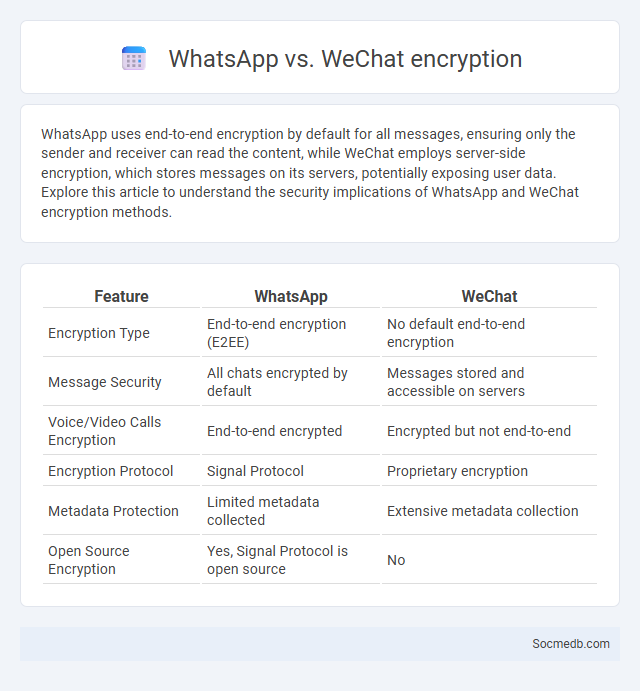
Photo illustration: WhatsApp vs WeChat encryption
WhatsApp uses end-to-end encryption by default for all messages, ensuring only the sender and receiver can read the content, while WeChat employs server-side encryption, which stores messages on its servers, potentially exposing user data. Explore this article to understand the security implications of WhatsApp and WeChat encryption methods.
Table of Comparison
| Feature | ||
|---|---|---|
| Encryption Type | End-to-end encryption (E2EE) | No default end-to-end encryption |
| Message Security | All chats encrypted by default | Messages stored and accessible on servers |
| Voice/Video Calls Encryption | End-to-end encrypted | Encrypted but not end-to-end |
| Encryption Protocol | Signal Protocol | Proprietary encryption |
| Metadata Protection | Limited metadata collected | Extensive metadata collection |
| Open Source Encryption | Yes, Signal Protocol is open source | No |
Overview of WhatsApp and WeChat
WhatsApp, owned by Meta Platforms, is a globally popular messaging app with over 2 billion active users, offering end-to-end encrypted text, voice, and video communication. WeChat, developed by Tencent, dominates the Chinese market with more than 1.3 billion monthly active users, integrating social media, messaging, mobile payments, and digital services into a single platform. Both platforms emphasize seamless communication but differ significantly in ecosystem scope and geographical user base.
Understanding Encryption in Messaging Apps
Understanding encryption in messaging apps is essential for protecting Your private conversations from unauthorized access. End-to-end encryption ensures that only You and the recipient can read the messages, as data is encrypted on the sender's device and decrypted only on the receiver's device. Popular messaging platforms like WhatsApp and Signal use advanced encryption protocols such as the Signal Protocol to safeguard user communications effectively.
What is End-to-End Encryption?
End-to-end encryption (E2EE) in social media ensures that messages are encrypted on the sender's device and only decrypted on the receiver's device, preventing intermediaries from accessing the content. Platforms such as WhatsApp and Signal implement E2EE to protect user privacy by securing conversations with cryptographic keys exclusive to the communicating users. This technology is critical for safeguarding sensitive information against hacking, surveillance, and unauthorized data breaches.
How WhatsApp Implements End-to-End Encryption
WhatsApp implements end-to-end encryption by using the Signal Protocol, which ensures that messages, calls, photos, and videos are encrypted on the sender's device and can only be decrypted by the recipient's device. This cryptographic approach uses a combination of public and private keys, making intercepted data unreadable to anyone, including WhatsApp servers. Security features like forward secrecy and encrypted message backups further enhance user privacy and protect communication from unauthorized access.
WeChat’s Approach to User Data Security
WeChat employs advanced encryption protocols and strict access controls to safeguard user data, ensuring confidentiality and protection against unauthorized breaches. The platform integrates multi-factor authentication and continuous monitoring systems to detect and prevent suspicious activities in real-time. Tencent's commitment to compliance with global data protection regulations enhances WeChat's reputation as a secure social media environment prioritizing user privacy.
Key Differences Between WhatsApp and WeChat Encryption
WhatsApp uses end-to-end encryption by default for all messages and calls, ensuring that only you and the recipient can read or listen to them, while WeChat employs a mix of encryption methods but does not offer end-to-end encryption for all communications. WhatsApp's encryption protocol is based on the Signal Protocol, known for its strong security and privacy features, whereas WeChat's encryption is less transparent and includes server-side data storage, which may expose messages to third-party access. Understanding these differences is crucial for users prioritizing privacy and secure communication on their social media platforms.
Privacy Concerns: WhatsApp vs WeChat
WhatsApp employs end-to-end encryption for all messages, ensuring your communications remain private and inaccessible even to the platform itself. In contrast, WeChat lacks comprehensive encryption, raising significant privacy concerns as messages can be monitored or accessed by third parties and authorities. Choosing between the two depends on how much you prioritize safeguarding your personal data during digital conversations.
Vulnerabilities and Security Risks
Social media platforms expose users to various vulnerabilities such as data breaches, phishing attacks, and identity theft that can compromise personal information. Cybercriminals exploit insecure privacy settings and weak passwords to gain unauthorized access to accounts, increasing the risk of fraud and misinformation. Protecting Your social media presence requires strong security practices including two-factor authentication and regular privacy audits.
Regulatory Compliance and Data Access
Social media platforms must adhere to strict regulatory compliance frameworks such as GDPR and CCPA to protect user privacy and data security. Ensuring your data access practices comply with these regulations helps prevent legal penalties and enhances user trust. Transparent data handling and robust consent mechanisms are essential for maintaining regulatory standards in the evolving digital landscape.
Choosing the Most Secure Messaging App
Selecting the most secure messaging app requires prioritizing end-to-end encryption, strong privacy policies, and regular security updates to protect Your conversations from unauthorized access. Apps like Signal and Telegram offer advanced encryption protocols, ensuring messages remain confidential and tamper-proof. Evaluating features such as open-source code, user authentication methods, and data retention policies helps maximize Your digital security while communicating on social media platforms.
 socmedb.com
socmedb.com